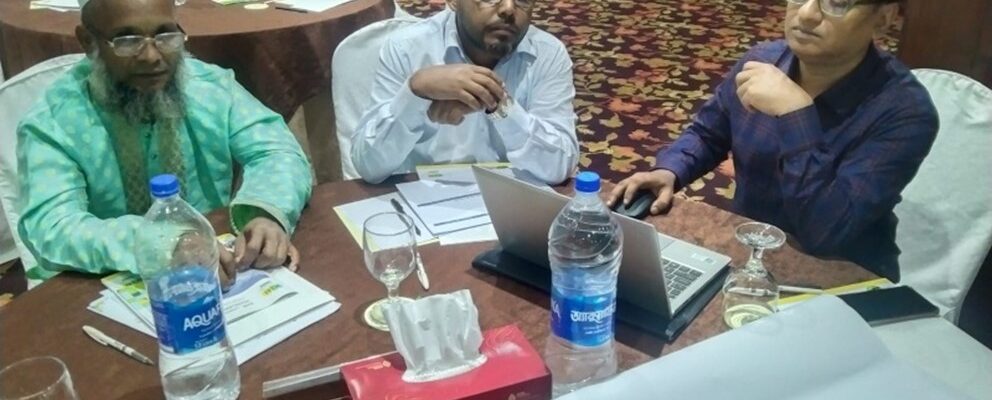Workshop Summary: Disaster Risk Reduction and Urban Resilience Training

A training workshop on ‘Disaster Risk Reduction and Urban Resilience’ was conducted from 1st to 3rd July 2024 at Hotel Sarina, Dhaka, Bangladesh. This training aims to enhance the capacity of local government units (LGUs) in Bangladesh by providing them with the necessary knowledge, tools and methodologies to build resilience and effectively manage disaster risks. This workshop is part of a broader effort to align local resilience initiatives with national and international frameworks, including the Sendai Framework for DRR and the Paris Agreement on climate action.
The workshop is jointly organized by ICLEI South Asia under the Climate Development Knowledge Network (CDKN) Project (Phase 3), supported by the Royal Netherlands Ministry of Foreign Affairs (DGIS) and Canada’s International Development Research Centre (IDRC), and by UNDRR Regional Office for Asia and the Pacific (ROAP) and Global Education and Training Institute (GETI), with support from The Department of Foreign Affairs and Trade (DFAT) of the Australian federal government.
The workshop drew 36 participants (29 male, 7 female) from 6 municipalities and 3 city corporations, representing various sectors such as politics, engineering, solid waste management, administration, and finance. Notable, Our CDKN partner city Nilphamari also attended this training session.
Workshop Activities:
- Day 1: The workshop was inaugurated by the Mayor of Mongla Port Municipality, who stressed the need for resilience to climate-induced disasters. UNDRR’s Assistant Programme Manager provided an overview of MCR2030 and its strategic objectives. Participants then assessed their cities using the Climate Resilience Scorecard.
- Day 2: ICLEI South Asia introduced the City Resilience for Climate Adaptation Planning (CRCAP) methodology, focusing on risk assessment and climate fragility within urban systems. Funding constraints and the need for continuity in projects were highlighted as major challenges.
- Day 3: The final day covered the development of climate-induced DRR action plans, featuring presentations from Dhaka North and Narayanganj City Corporations on their climate action plans. The workshop concluded with a visit to the Emergency Operation Centre at DNCC, where participants learned about its critical role in disaster management.
Key Discussions:
- Prioritizing DRR measures and enhancing local governments’ technical and financial capacities are crucial.
- Maintaining DRR protocols and ensuring interdepartmental coordination is essential to avoid cascading effects during disasters.
- Leveraging national and international financial resources and integrating pilot interventions with real-time demonstrations can significantly enhance impact.
Outcome:
The significant outcomes from this training:
- Incorporating Climate Change and DRR into Urban Resilience Planning: Participants recognized the necessity of integrating climate change and disaster risk reduction (DRR) into urban resilience planning to enhance resilience against climate-induced disasters.
- Global Partnership with Regional Focus: Making Cities Resilient 2030 (MCR2030), a global partnership with a regional focus guiding local governments along the Resilience Roadmap and providing opportunity for cities to connect with partners with various expertise, strengthening national-local linkage and learning among cities.
- Using UNDRR’s Climate Resilience Scorecard: Participants learned to utilize the UNDRR’s Climate Resilience Scorecard for Cities to assess resilience gaps and needs, which supports the integration of climate change adaptation into local DRR planning.
- Applying ICLEI South Asia’s CRCAP Methodology: Participants were introduced to ICLEI South Asia’s CRCAP methodology, gaining skills in conducting climate risk and vulnerability assessments to identify impacted urban systems and actors, assess adaptive capacities, and develop climate fragility statements.
- Identifying Adaptive Capacities: Through theoretical demonstrations and exercises, participants learned how to identify the adaptive capacities of actors and urban systems, enabling better preparation and response to climate impacts.
- Urban Resilience Programmes and Planning: Participants learned to identify urban resilience programmes, prioritize actions, and integrate them into the planning process through both theoretical demonstrations and practical exercises.
- Showcasing Practical Applications and Best Practices: The Climate Action Plan of Dhaka and the City Resilient Climate Action Plan for Narayanganj were showcased to demonstrate practical applications and best practices for urban climate resilience.
- Learning from the Emergency Operation Center Visit: Participants visited the Emergency Operation Center (EOC) at Dhaka North City Corporation (DNCC) and gained valuable insights into its functionality during disasters. DNCC higher officials demonstrated the center’s operations, highlighting the critical role of the EOC in managing emergencies.